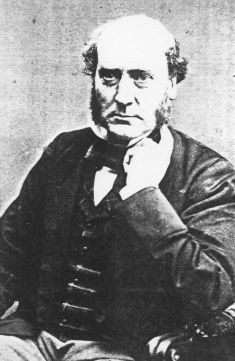William Sharpe was an Oxford college head. [1]
Sharpe was educated at Westminster School. [2] He was Principal of Hertford College, Oxford, from 1753 to 1757.
William Sharpe was an Oxford college head. [1]
Sharpe was educated at Westminster School. [2] He was Principal of Hertford College, Oxford, from 1753 to 1757.

Trinity College is a constituent college of the University of Cambridge. Founded in 1546 by King Henry VIII, Trinity is one of the largest Cambridge colleges, with the largest financial endowment of any Oxbridge college. It is the largest Oxbridge college measured by the number of undergraduates (730). Trinity performs exceptionally as measured by the Tompkins Table, coming top from 2011 to 2017, and regaining the position in 2024. Trinity was the top-performing college for the 2020–21 undergraduate exams, obtaining the highest percentage of good honours.

Sir George Gilbert Scott, largely known as Sir Gilbert Scott, was a prolific English Gothic Revival architect, chiefly associated with the design, building and renovation of churches and cathedrals, although he started his career as a leading designer of workhouses. Over 800 buildings were designed or altered by him.
The Regius Professorships of Divinity are amongst the oldest professorships at the University of Oxford and the University of Cambridge. A third chair existed for a period at Trinity College Dublin.

Dean Frederic William Farrar was a senior-ranking cleric of the Church of England, schoolteacher and author. He was a pallbearer at the funeral of Charles Darwin in 1882. He was a member of the Cambridge Apostles secret society. He was the Archdeacon of Westminster from 1883 to 1894, and Dean of Canterbury from 1895 until his death in 1903.

The Ascension Parish Burial Ground, formerly known as the burial ground for the parish of St Giles and St Peter's, is a cemetery off Huntingdon Road in Cambridge, England. Many notable University of Cambridge academics are buried there, including three Nobel Prize winners.
The White's Chair of Moral Philosophy was endowed in 1621 by Thomas White, Canon of Christ Church as the oldest professorial post in philosophy at the University of Oxford.
William Barlow was an Anglican priest and courtier during the reign of James I of England. He served as Bishop of Rochester in 1605 and Bishop of Lincoln in the Church of England from 1608 until his death. He had also served the church as Rector of St Dunstan's, Stepney in Middlesex and of Orpington, in Kent. He was also Dean of Chester Cathedral, and secured prebends in Chiswick and Westminster.

The Choir of St George's Chapel at Windsor Castle exists to sing services in St George's Chapel at Windsor Castle.

English Gothic is an architectural style that flourished from the late 12th until the mid-17th century. The style was most prominently used in the construction of cathedrals and churches. Gothic architecture's defining features are pointed arches, rib vaults, buttresses, and extensive use of stained glass. Combined, these features allowed the creation of buildings of unprecedented height and grandeur, filled with light from large stained glass windows. Important examples include Westminster Abbey, Canterbury Cathedral and Salisbury Cathedral. The Gothic style endured in England much longer than in Continental Europe.
Oswin Harvard Gibbs-Smith, CBE was Dean of Winchester in the third quarter of the 20th century.
Charles Este, (1696–1745), was bishop of Ossory (1735–1740) and subsequently of Waterford and Lismore (1740–1745).

Henry George Woods was an Anglican clergyman and academic. He was President of Trinity College, Oxford, from 1887 to 1897 and Master of the Temple from 1904 to 1915.
Andrew Tremlett is a British Church of England priest. Since 2022, he has served as Dean of St Paul's, and is therefore the head of the Chapter of St Paul's Cathedral and the most senior priest in the Diocese of London. Previously, he was a canon residentiary of Bristol Cathedral (2008–2010), a canon residentiary of Westminster Abbey (2010–2016) and Dean of Durham (2016–2022).

Sir Frederick Adair Roe, 1st Baronet was a British barrister and magistrate who was the Chief Metropolitan Police Magistrate from 1832 to 1839.

Samuel Compton Cox (1757–1839) was a British barrister, judge and legal writer. He became a Master in Chancery in 1804.
{{cite book}}: CS1 maint: location missing publisher (link)